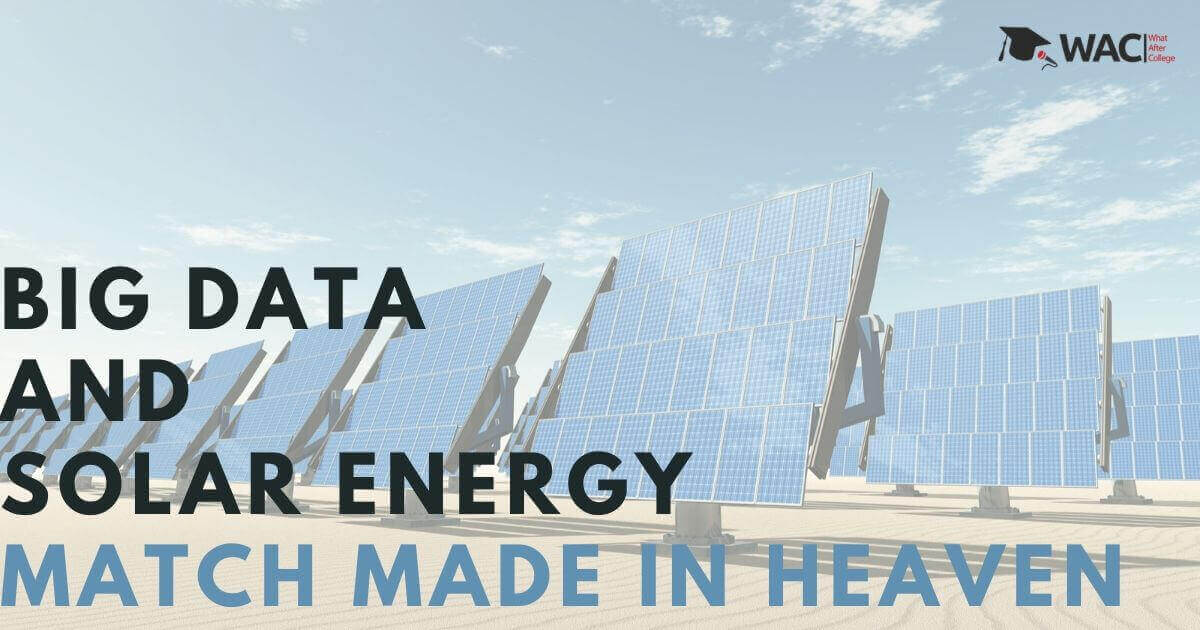Through a blend of climate data, satellite feeds, machine learning, and predictive analytics, we are now entering a future where renewable energy sources can be reliable and consistent. In other words, the latest available technology in Big Data may turn out to be the missing puzzle piece in the challenge to the adoption of solar energy; and that is why they are a match made in heaven.
As the awareness of climate change grows, one thing has become clear: Using energy from renewable sources is urgent to reduce unsafe greenhouse gas emissions. Keeping in mind that even though wind and solar energy sources are important, they can be unpredictable. What amount of energy will a single panel or solar plant add to the grid per day? The response to that question has been tricky.
Some of the time it’s cloudy. Sometimes the wind does not blow. So to be able to depend on the sun or the wind, we must know how much power they can produce, their demand, and use the energy to meet the requirements of the customers as well as possible. Some of the ways in which Big Data and Solar energy prove to be a match made in heaven are:
1. Prediction of Weather Conditions
Predicting weather conditions is crucial for solar power and other renewable sources to work efficiently. Predictive analytics of Big Data helps energy companies to balance solar energy with traditional power generating sources to keep up with the demand. Using satellite data, real-time weather, and environment data, companies can now make smart and informed infrastructure designs. As a result, they can increase efficiency by 10% even without any addition of new panels or turbines.
2. Supporting Active Maintenace
One of the best things about solar energy sources is that it supports a less centralized energy grid. Companies disperse the solar panels and wind turbines geographically and install them in places where they can get maximum productivity. Maintenance of this physical infrastructure is hard when we compare to traditional energy sources. However, Big Data provides insights and the means to manage these solar energy plants and wind turbines by monitoring individual panels, parts, and turbines.
A small crew can easily oversee the operations of even large energy production sites. Above all, there are sensors available which indicate when the solar energy panels are not performing well, and they produce relevant data that can send an indication to the staff.
3. Choosing what sites to build on
After a couple of decades, companies must decide whether to continue to remain and produce power on the same site or decommission the site. To make the decision, it requires them to have data about maintenance costs, productivity, projected costs. Big Data makes it easier to make such decisions about solar energy plants.
Big Data also makes it easier to choose suitable sites for solar energy projects; as well as understanding the impact of such a project on the environment. Mapping specialists and surveyors can use the data to balance the different needs of the landscape and the desired productive result of the project.
4. Bringing the cost down
Cost is one of the barriers when it comes to the adoption of solar energy and other renewable sources of energy. However, Solar panels are becoming more affordable as technology is making progress and making it possible to leave the traditional sources of energy.
Big Data helps in bringing down the cost of solar energy projects. It is a natural progression that includes optimizing the placement and maintenance of the infrastructure. For instance, better-connected energy grids contribute to the cost-effectiveness by providing real-time analysis in case of outages.
5. Creating new energy models
The combination of Big Data and solar energy has helped in the creation of new energy business models. In addition to the PPAs, there are solar leases and community-based solar co-ops. Solar panels may be affordable enough for some cases. However, in other cases, having the right data can help in generating other agreements that are better for all the parties involved.

All you need to know about Big Data
| Introduction to Big Data | Career Options after Big Data |
| 4 V’s of Big Data | Big Data for Business Growth |
| Uses of Big Data | Benefits of Big Data |
| Demerits of Big Data | Salary after Big Data Courses |
Learn Big Data
| Top 7 Big Data University/ Colleges in India | Top 7 Training Institutes of Big Data |
| Top 7 Online Big Data Programs | Top 7 Certification Courses of Big Data |
Learn Big Data with WAC
| Big Data Webinars | Big Data Workshops |
| Big Data Summer Training | Big Data One-on-One Training |
| Big Data Online Summer Training | Big Data Recorded Training |
Other Skills in Demand
| Artificial Intelligence | Data Science |
| Digital Marketing | Business Analytics |
| Big Data | Internet of Things |
| Python Programming | Robotics & Embedded System |
| Android App Development | Machine Learning |

